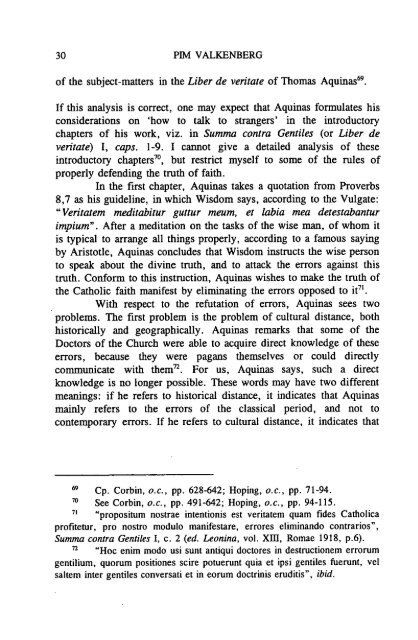Jaarboek Thomas Instituut 1997 - Thomas Instituut te Utrecht
Jaarboek Thomas Instituut 1997 - Thomas Instituut te Utrecht
Jaarboek Thomas Instituut 1997 - Thomas Instituut te Utrecht
Create successful ePaper yourself
Turn your PDF publications into a flip-book with our unique Google optimized e-Paper software.
30 PIM VALKENBERG<br />
of the subject-mat<strong>te</strong>rs in the Liber de verita<strong>te</strong> of <strong>Thomas</strong> Aquinas".<br />
If this analysis is correct, one may expect that Aquinas formula<strong>te</strong>s his<br />
considerations on 'how to talk to strangers' in the introductory<br />
chap<strong>te</strong>rs of his work, viz. in Summa contra Gentiles (or Liber de<br />
verita<strong>te</strong>) I, caps. 1-9. I cannot give a detailed analysis of these<br />
introductory chap<strong>te</strong>rs", but restrict myself to some of the rules of<br />
properly defending the truth of faith.<br />
In the first chap<strong>te</strong>r, Aquinas takes a quotation from Proverbs<br />
8,7 as his guideline, in which Wisdom says, according to the Vulga<strong>te</strong>:<br />
..Verita<strong>te</strong>m meditabitur guttur meum, et labia mea de<strong>te</strong>stabantur<br />
impium": Af<strong>te</strong>r a meditation on the tasks of the wise man, of whom it<br />
is typical to arrange all things properly, according to a famous saying<br />
by Aristotle, Aquinas concludes that Wisdom instructs the wise person<br />
to speak about the divine truth, and to attack the errors against this<br />
truth. Conform to this instruction, Aquinas wishes to make the truth of<br />
the Catholic faith manifest by eliminating the errors opposed to iel.<br />
With respect to the refutation of errors, Aquinas sees two<br />
problems. The first problem is the problem of cultural distance, both<br />
historically and geographically. Aquinas remarks that some of the<br />
Doctors of the Church were able to acquire direct knowledge of these<br />
errors, because they were pagans themselves or could directly<br />
communica<strong>te</strong> with them". For us, Aquinas says, such a direct<br />
knowledge is no longer possible. These words may have two different<br />
meanings: if he refers to historical distance, it indica<strong>te</strong>s that Aquinas<br />
mainly refers to the errors of the classical period, and not to<br />
con<strong>te</strong>mporary errors. If he refers to cultural distance, it indica<strong>te</strong>s that<br />
69 Cp. Corbin, O.C., pp. 628-642; Hoping, O.C., pp. 71-94.<br />
70 See Corbin, O.C., pp. 491-642; Hoping, O.C., pp. 94-115.<br />
71 "propositum nostrae in<strong>te</strong>ntionis est verita<strong>te</strong>m quam fides Catholica<br />
profi<strong>te</strong>tur, pro nostro modulo manifestare, errores eliminando contrarios ",<br />
Summa contra Gentiles I, c. 2 (ed. Leonina, vol. Xlll, Romae 1918, p.6).<br />
72 "Hoc enim modo usi sunt antiqui doctores in destructionem errorum<br />
gentilium, quorum positiones scire potuerunt quia et ipsi gentiles fuerunt, vel<br />
sal<strong>te</strong>rn in<strong>te</strong>r gentiles conversati et in eorum doetrinis eruditis", ibid.








